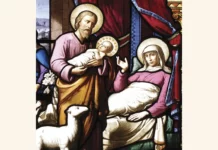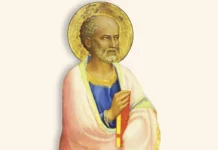Admirable for her dedication and joy in caring for the poor, Lindalva surrendered her life as proof of her love for God and to preserve her purity.
On Wednesday of Holy Week in 1500, a naval fleet from the far side of the Atlantic landed on Brazilian soil. A few days later, on Easter Sunday, under an enormous Cross planted on the sandy shores, Franciscan Friar Henrique de Coimbra celebrated Brazil’s first Mass. On the beautiful beaches of Bahia, a country of continental proportions was baptized. With the planting of this seed, Brazil, known as the Land of the Holy Cross, thus began all its future heroism and Catholicity, which now fill the pages of its history.
One of these triumphs unfolded only recently, in our age marked by pragmatism and faithlessness and so wanting in individuals willing to serve God and others with a pure and generous heart.
It was also during a Holy Week in Bahia that a contemporary religious sister shed her blood to defend her chastity, like St. Maria Goretti, for love for obedience, and in service of the needy, fulfilling her vocation as a Daughter of Charity of St. Vincent de Paul and St. Louise de Marillac. Her name was Sister Lindalva Justo de Oliveira.
Desire to help others
She was born on October 20, 1953, into a farming family from the municipality of Açu in Rio Grande do Norte, and was baptized three months later.
Her father, João Justo da Fé, worked the land to feed and raise sixteen children. He was a pious man of strong character, who admired and sought to imitate, in his own way, the valour of the Old Testament Patriarchs. Her mother, Maria Lucia, took the responsibility that she assumed in marriage seriously—the formation of her children. In this Catholic family, the love between parents and children was complemented by the discipline necessary to curb wrongs.
Since childhood, Lindalva showed a natural desire to help others and keenly felt their sufferings. She was a peacemaker who seldom lost her patience. She liked to run, swim in the nearby pond and climb trees to enjoy their fresh fruit. Her favourite pastime was making clay dolls, which she left to dry in the sun, and then dressed in tiny clothes that she had sewn from scraps of cloth.
She was mature for her age and, aware of the sacrifices that her parents made to raise their large family, she looked for ways to help. While still a child, she became an invaluable aid to her mother by helping her with the sewing and cooking. Following her mother’s example, she learned to give from their own meagre pantry to others who were in greater need.

In the world, yet not of the world
As the family grew, schooling became a necessity—and an additional financial burden. João decided to move to Açu, where several of his children obtained employment. Lindalva completed her elementary education and then took a job as a nanny for a wealthy family. When anyone needed help, whether because of illness or any other reason, they naturally turned to her. “You must have a vocation to be a nurse, because you are always willing and happy to help!” said one of her friends.
When her eldest sister, who was married and lived in Natal, gave birth to her first daughter, Lindalva went to live with her in the capital, helping the young mother and continuing her studies. She took a job as an office clerk and lived as a girl of high morals. Although she lived in the world, she began to show that she was not of the world. Rather than considering marriage, she devoted her spare time as a volunteer in a home for the elderly of the Daughters of Charity.
Here, the girl who was naturally shy and reserved became lively and communicative, with a contagious joy. The elderly whom she served would anxiously await her arrival, since she showed them such patience and kindness—signs of the vocation that was blossoming in her soul. “The fruit of the Spirit is love, joy, peace, patience, kindness, goodness, faithfulness” (Gal 5:22), says the Apostle Paul. Lindalva constantly manifested these fruits throughout her relatively short life.
Joy in the service others
To prepare for the most important decision of her life, she began nursing studies, and in September, 1987, she wrote to the Provincial of the Daughters of Charity, requesting admission as a postulant. “For a long time I have felt the desire to enter religious life, but only now am I available to follow the calling of God. I am ready to dedicate myself to caring for the poor.” 1
Two months later, she was accepted and sent to the community at the St. Teresa Educational Institute in Olinda, Pernambuco to complete her postulancy. Throughout this period, she strengthened her resolution to base her spiritual life upon happiness in Christ and to do good to her neighbours. Her superiors testified to her willingness, humility and joyfulness in serving the poor and elderly, as well as the sisters in the community.
“I want to be a saint!”
She progressed in the interior life, giving herself ever more completely to God, and entrusting her destiny to Him, following the counsel of David: “Commit your way to the Lord; trust in Him, and He will act” (Ps 36:5).
Her letters reflect her surrender to the Lord, and reveal the authenticity of her chosen vocation. “I am very happy. […] My future is in God’s hands, but I desire with all my heart to always serve with humility, in the love of Christ,” she wrote to a friend in March of 1988.
Dom Chautard teaches that the soul of the apostolate—the active life—is the overflow from the interior life. Lindalva’s gift of service was grounded in a spirit of prayer. In addition to alleviating the physical sufferings of the poor, she nourished their souls with prayer and counsel. She prayed with them, especially the Rosary, accompanying her prayers with hymns to Our Lady.
Her favourite prayer was the Rosary. She always carried a Rosary and prayed in spare moments. “There are so many people that need my help,” she said, “and the most I can do is pray for them.”
She was earnest about progressing in the spiritual life, and asked her superior, Sister Maria Expedita Alves, how she could become a saint. This sister wisely replied:
“My daughter, no one is born a saint; this can only be achieved by seeking perfection in daily life, and in each action, even the most insignificant.”
Lindalva looked deeply at her superior and replied, “I want to be a saint.”
“Here everything is grace!”
This ardent desire and the practice of the evangelical counsels of poverty, chastity and obedience marked her simple and common journey toward the fullness of religious life.
Under the guidance of her superiors, she was admitted to the novitiate, initiating another step in her surrender to Jesus, within the charism of her congregation: caring for the poor and needy. On the feast of Our Lady of Mount Carmel, July 16, 1989, she received the habit of a Daughter of Charity and the name Sister Lindalva.
That same year, she wrote to a friend, expressing her fulfilment in the religious life: “Here everything is filled with grace! We live in deep silence and union with God. […] My thoughts and the desire I have to love God above all things fills me with happiness. Another part of our life is the love for people that we win over, but it is through the love of God that we love creatures; we should never let this love be greater than the love of God.”

Beloved by all
When her novitiate ended on January 26, 1991, Sister Lindalva was sent to a shelter for the elderly in Salvador, the capital of Bahia. In a letter to one of the religious sisters, she renewed her resolutions to be humble and modest in the trials that lay ahead, citing words from Scripture: “Fear not, for I have redeemed you; I have called you by name, you are mine. When you pass through the waters I will be with you; and through the rivers, they shall not overwhelm you” (Is 43:1-2).
With this confidence, she crossed the threshold of the nineteenth century mansion, the headquarters for the Dom Pedro II Home, under public municipal administration and in the care of the Daughters of Charity. She was given the responsibility of caring for the St. Francis Pavilion on the first floor, which lodged 40 elderly residents. Before long, she had endeared herself to her superior, sisters and residents with her joyfulness and aura of holiness.
She consoled the afflicted by reminding them of the sufferings of the Saviour, and arranged light work for those who were capable of it, so that they would feel useful. Sister Lindalva was always where she was needed, filled with vitality and charity.
In addition to caring for the material needs of the elderly, she also attended to their life of piety. She prayed the Rosary with them and brought them to the chapel, so that they could receive the sacraments. Her vigilance regarding chastity was evident even when she went to find the priest, since she always asked someone to accompany her. She was diligent in fulfilling the acts of the community and whenever she had a few spare moments, she could invariably be found praying in the chapel.
In the little time she had outside her duties in the Home, Sister Lindalva participated in the St. Louise de Marillac Volunteers of Charity Movement, which promoted visits to the sick and elderly who lived in the suburbs. The movement was divided into groups; she belonged to the St. Maria Goretti Group, which was perhaps not by chance, as events would prove.
The Ascent to Mount Calvary
Little did this holy nun imagine that the Home she loved would be her Calvary—the place destined by Christ to mingle her blood with His. Problems began in January, 1993, when Augusto da Silva Peixoto was admitted. He was 46 years old—not old enough to be in a charitable institute for the aged, but the nuns felt obliged to accept him. He was lodged in the pavilion under the care of Sister Lindalva.
He was a man devoid of moral and religious principles, and took an evil interest in Sister Lindalva of unblemished life and began harassing her. Warnings from the other residents, as well as from the director of the social sector of the Home, only served to increase his strong feelings of frustration at being refused.
Sister Lindalva, who preferred to die than tarnish her vow of chastity, exercised great caution and avoided any attitude which could be misinterpreted by the devious individual. She reported the situation to some of the nuns and workers of the volunteer movement and she redoubled her prayers. However, out of love for the elderly and obedience to her mandate to serve at that Home, she did not want to leave. She had a strong, firm and fearless character and was not one to flee the ‘battlefield.’ “I would prefer to shed my blood rather than leave here,” she once said during community recreation.
“You never yielded”
On the Monday of Holy Week, 1993, Augusto bought a fishing knife from the public market, with the deliberate intention of killing the nun who had placed an insurmountable barrier to his evil intentions.
During that entire week, Sister Lindalva had taken part at the morning Way of the Cross in the parish of Boa Viagem. As she participated in the procession through the streets of the neighbourhood that early morning of Good Friday, April 9, 1993, meditating on the Sorrowful Passion of Jesus, little did she know that she was quickly approaching her own Calvary, which would be consummated that very day.
After the Way of the Cross, she returned to the home and headed toward the dining room to serve the residents their breakfast. She did not notice Augusto, who was seated on a bench in the garden. He had been waiting for her, and as she entered the back door of the room, he followed her inside. In an outburst of diabolical and insane fury, he stabbed her from behind. She barely had time to cry out “God protect me.” She received a total of 44 knife wounds.
As he wiped the knife, stained with innocent blood, on his clothing, the criminal raved: “You never yielded! This is your reward…” thus proving that Sister Lindalva had given her life as a witness of the love of God, by preserving her purity, in a true martyrdom to which the residents themselves gave testimony.

Seed of new vocations
Throughout the night, a continual stream of faithful came to the Home to pay their last respects to the nun. The Archbishop Primate of Brazil, at that time Cardinal Lucas Moreira Neves, officiated at the funeral. “The blood of the victim will be the seed of new vocations, not only for the Daughters of Charity, but also for all the Congregations of the Church of God,” he said in his homily.
The Church proclaimed Sister Lindalva Blessed on December 2, 2007, in a ceremony in Manoel Barradas Stadium, in Salvador. Her mortal remains are kept in the chapel of the Dom Pedro II Home. The life of Blessed Sister Lindalva proves that joy and purity are characteristic notes of holiness, to which everyone is called.
During the Beatification ceremony, Cardinal Saraiva Martins declared: “I desire for everyone, and beseech from the Lord for each one, that joyful vitality which knows how to transmit itself to others, and which was perhaps the most enchanting legacy of Lindalva. A joyful vitality which is contagious to those around us, filling them with the ineffable joy which plunges its roots in the footsteps of the Resurrected Christ, aware that as children of God, we are all called to be saints and that sanctity is a path of freedom for each one.” 2 ◊







